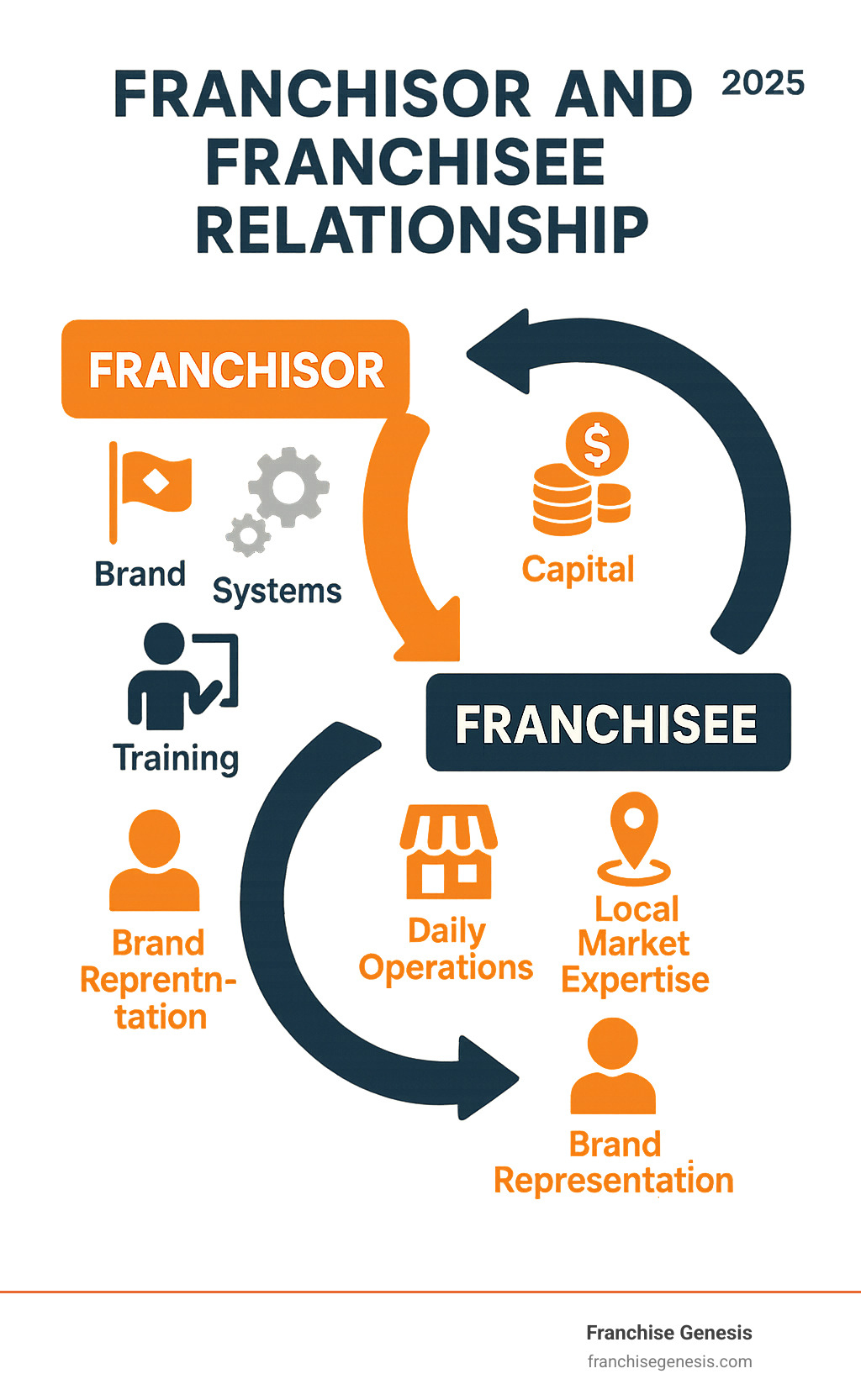Why Understanding Your Future Franchisee is Crucial for Expansion Success
A franchisee is an independent business owner who purchases the right to operate a business using your established brand, systems, and support in exchange for fees and royalties. They serve as your local market representative, investing their own capital while following your proven business model.
Key Franchisee Characteristics:
- Independent operator – owns and manages their specific location
- Brand ambassador – represents your company in their local market
- Licensee – has rights to use your trademarks and systems, not ownership
- Investor – provides capital for startup costs and ongoing fees
- System follower – adheres to your operational standards and procedures
Understanding what drives a quality franchisee candidate is essential for any business owner considering franchising as a growth strategy. The franchisee relationship forms the backbone of successful franchise expansion – these aren’t just customers buying your product, they’re dedicated partners who will represent your brand daily in their local communities.
Research shows that 90% of franchisees enjoy operating their business and 88% enjoy being part of their organization. This satisfaction stems from the unique value proposition franchising offers: the security of a proven business model combined with the independence of business ownership.
As someone who has guided business owners through franchise development at Franchise Genesis, I’ve seen how understanding the franchisee mindset transforms expansion success. Having helped scale businesses like an ABA therapy franchise to over 100 locations, I know that selecting and supporting the right franchisee partners makes all the difference in building a thriving network.

Understanding the Role of Your Future Franchisee
Picture this: you’ve built a successful business, and now you’re ready to expand. But instead of opening more locations yourself, you’re considering bringing in partners who will invest their own money and energy into growing your brand. These partners are your future franchisees, and understanding their role is absolutely crucial to your expansion success.
A franchisee is an independent business owner who purchases the right to operate under your established brand and proven system. Think of them as licensed operators rather than employees or co-owners. They’re investing their capital and committing their time to run a location using your trademarks, business model, and operational guidelines.
This relationship creates a powerful win-win scenario. Your franchisee gets access to a proven business model with lower risk than starting from scratch, while you get to expand your footprint without the massive capital investment required for company-owned locations. It’s a partnership built on mutual benefit and shared success.
The beauty of this model lies in the balance of independence and structure. Your franchisee owns and operates their specific location, making day-to-day decisions and managing their local market. However, they agree to follow your established systems and maintain your brand standards. This ensures customers receive the same quality experience whether they visit the original location or a franchise across the country.
What makes this relationship work is the franchisee’s dual role as both entrepreneur and brand ambassador. They bring local market knowledge, personal investment, and the dedication that comes with business ownership. In return, they receive comprehensive training, ongoing support, and the power of an established brand name.
Understanding this dynamic is essential as you consider franchising your business. Your future franchisees aren’t just buying a business opportunity – they’re buying into your vision and committing to represent your brand in their community. Understanding the key to building a thriving franchise network starts with recognizing the value and responsibility that comes with this partnership.
The Core Responsibilities of a Successful Franchisee
When you welcome a franchisee into your network, they’re taking on a comprehensive set of responsibilities that directly impact both their success and your brand’s reputation. Let’s walk through what makes a franchisee truly successful in their role.
Day-to-day operations form the foundation of their responsibilities. Your franchisee handles everything from opening the doors each morning to ensuring smooth service throughout the day. They manage inventory, oversee quality control, and make sure every customer interaction reflects your brand standards.
Staff management is where your franchisee really shines as a local leader. They’re responsible for hiring team members who fit your brand culture, providing ongoing training based on your systems, and creating a positive work environment. While you’ll provide the training materials and guidelines, they’re the ones implementing these programs and motivating their team daily.
The local marketing aspect gives your franchisee a chance to connect with their community while staying true to your brand. They’ll execute local advertising campaigns, participate in community events, and build relationships with neighboring businesses. Of course, all marketing efforts must align with your brand guidelines and receive proper approval.
Upholding brand standards is perhaps the most critical responsibility. Your franchisee ensures that every product or service delivered meets your exact specifications. Whether it’s the recipe for your signature dish or the greeting customers receive, consistency across all locations builds the trust that makes franchising successful.
Financial management keeps the business running smoothly. Your franchisee handles budgeting, manages cash flow, pays royalties and fees on time, and works toward profitability. They’re running a real business with real financial obligations and opportunities.
Finally, customer service excellence ties everything together. Your franchisee builds lasting relationships with customers, handles concerns professionally, and creates the positive experiences that generate repeat business and referrals.
These responsibilities work together to create a successful franchise operation. Our Franchise Operations Manual provides the detailed guidance your franchisees need to excel in each of these areas.
How a Franchisee Upholds Your Brand

Your brand is your most valuable asset, and your franchisee becomes its guardian in their local market. The way they uphold your brand standards can make or break the customer experience and, ultimately, your franchise’s success.
Adherence to the operations manual serves as the foundation for brand consistency. This comprehensive guide becomes your franchisee’s roadmap for everything from product preparation to customer service protocols. When they follow these detailed procedures, customers receive the same quality experience they expect from your brand, regardless of location.
Consistent product and service delivery is where your brand promise becomes reality. Your franchisee must ensure that your signature burger tastes exactly the same whether it’s served in their location or your flagship store. This consistency builds customer trust and loyalty across your entire network.
Approved marketing materials keep your brand message clear and professional. While your franchisee may want to connect with their local community through advertising, all materials must align with your brand guidelines. This prevents mixed messages and maintains the professional image you’ve worked hard to build.
Protecting intellectual property is a shared responsibility that your franchisee takes seriously. They have the privilege of using your trademarks, logos, and proprietary systems, and in return, they must safeguard these valuable assets from misuse or unauthorized copying.
Quality control happens at every level of the operation. Your franchisee maintains clean, well-organized facilities, ensures staff members present themselves professionally, and addresses any issues that could reflect poorly on your brand. They understand that every customer interaction is a reflection of your entire franchise system.
The commitment to brand standards creates a powerful network effect. When customers have a great experience at one location, they’re more likely to visit other franchise locations with confidence. This mutual benefit reinforces why brand consistency is so important to everyone in your franchise family.
Through Franchise Training & Success programs, we help ensure your franchisees have the knowledge and tools they need to represent your brand with pride and professionalism from day one.
The Value Proposition: What Attracts a Quality Candidate?
A potential franchisee considering investing their life savings into your concept is weighing the security of a proven system against their desire for independence as a business owner.
Franchising’s value lies in offering what independent startups can’t:
-
A proven business model: Your future franchisee buys into a system where you’ve already refined the processes. This is why franchises have significantly higher success rates than independent businesses, where much of the guesswork remains.
-
Brand recognition: This is their instant competitive advantage. A franchisee steps into a business where customers already know and trust the name, saving them from building awareness from scratch.
-
Comprehensive training: You transform first-time business owners into confident operators. This training is their safety net, ensuring they feel prepared.
-
Ongoing support: A franchisee isn’t alone. They have access to experienced managers and a support system that independent owners lack.
-
Marketing power: Your franchisee benefits from national campaigns and professional materials, getting big-business marketing muscle with small-business flexibility.
-
Supply chain access: Instead of negotiating with dozens of suppliers, your franchisee plugs into your optimized systems, getting better pricing and reliability.
These advantages attract quality candidates who understand they’re joining a system designed for success. This is Why You Should Franchise your business to attract partners who will help you scale effectively.
Overcoming Common Challenges for a Franchisee

Franchising isn’t perfect, and quality candidates know this. To attract the right partners, you must address their potential concerns head-on with genuine solutions.
-
Limited Autonomy: A potential franchisee might fear being micromanaged. Reframe this: the “restrictions” are their competitive advantage. Your clear systems and procedures are a blueprint for success that took you years to develop. The goal is a systems-based business, which allows your franchisee to achieve consistent results. That’s liberation, not limitation.
-
Ongoing Fees and Royalties: Your franchisee must see clear value for their investment. You must demonstrate that your ongoing support—from training and marketing to operational guidance—delivers returns that far exceed the costs. When the value exchange is fair, franchisees recognize the worth of their investment, with 85% feeling positive about their relationship with their franchisor.
-
Brand Risk: A franchisee rightfully worries that another location’s poor performance could harm their reputation. This is where your commitment to system-wide standards is crucial. You must demonstrate strong enforcement to protect every franchisee by maintaining brand integrity.
Your support framework should address these challenges with robust solutions, including training, field support, marketing programs, supply chain management, R&D, technology, and detailed operational manuals. When you proactively address these concerns, you build lasting partnerships with owners who trust your system.
The Journey from Prospect to Partner
Turning an interested prospect into a successful franchisee partner isn’t just about making a sale – it’s about building the foundation for a long-term relationship that benefits everyone involved. This journey requires patience, careful evaluation, and a commitment to finding the right fit rather than just any willing buyer.
The change begins with our selection process, where we identify candidates who bring more than just financial resources to the table. We’re looking for individuals with leadership skills, strong communication abilities, problem-solving experience, and a genuine passion for customer service. These transferable skills often matter more than industry experience because we can teach our systems, but we can’t easily teach character and work ethic.
Lead generation serves as our starting point for finding these quality candidates. We cast a wide net through online advertising, franchise portals, referrals from existing franchisees, and strategic partnerships. The goal isn’t to generate the most leads, but to attract prospects who align with our brand values and have realistic expectations about franchise ownership.
Once we’ve identified potential candidates, we move into what many call “Findy Day” – though we prefer to think of it as a mutual interview process. This crucial step brings qualified prospects to our headquarters where they can meet our team, observe our operations firsthand, and ask the tough questions that matter. It’s equally important for us because we get to assess their personality, commitment level, and cultural fit with our organization.
Validation calls represent one of the most valuable parts of our process. We actively encourage prospects to speak directly with our existing franchisees about their real-world experiences. These conversations provide unfiltered insights into everything from daily operations to our support quality. Smart prospects will ask about challenges, profitability, and whether they’d make the same investment decision again. This transparency builds trust and helps ensure new franchisees enter our system with realistic expectations.
The importance of being selective cannot be overstated. As the research suggests, recruiting a franchisee is virtually identical to interviewing a key employee – except this “employee” brings significant capital investment and will represent our brand in their community for years to come. We’re not looking for anyone with money; we’re seeking dedicated partners who will accept our systems, serve customers excellently, and contribute to our collective success.
This selective approach means we sometimes say no to candidates who might seem financially qualified but lack the right mindset or commitment level. It’s better to grow slowly with the right partners than quickly with the wrong ones. Every franchisee we add either strengthens or weakens our entire network, making careful selection essential for sustainable growth.
At Franchise Genesis, we specialize in helping businesses Transform Leads into Loyal Franchisees with a Proven Sales Strategy, ensuring you attract and select partners who will drive your expansion success. Our expertise in Franchise Lead Generation creates a steady pipeline of qualified candidates ready to join your growing network.
Structuring the Legal and Financial Framework
Creating a solid legal and financial foundation protects both parties and sets clear expectations for the franchisee relationship. This framework isn’t just about compliance – it’s about building trust through transparency and ensuring everyone understands their rights and responsibilities from day one.
The Franchise Disclosure Document (FDD) serves as the cornerstone of this framework. This comprehensive document, required by the FTC, provides prospective franchisees with everything they need to make an informed decision about joining our system. We must provide the FDD at least 14 days before any agreement is signed or money changes hands, giving candidates time to review it thoroughly with their advisors.
The FDD covers 23 specific items, including our company history, financial performance, initial and ongoing fees, territory rights, and the obligations of both parties. While it might seem overwhelming at first glance, this document protects everyone by ensuring complete transparency about what the franchisee can expect from us and what we expect in return.
The Franchise Agreement represents the legally binding contract that governs our ongoing relationship. Think of it as the rulebook that defines how we’ll work together for the term of the agreement, typically 10-20 years with renewal options. This document outlines operational requirements, fee structures, territory boundaries, and conditions for transfer or termination.
We always encourage prospective franchisees to have experienced franchise attorneys review both documents. While the agreement isn’t designed to be “50/50 fair” like a partnership, it should be clear, comprehensive, and legally sound. The franchisee needs to understand exactly what they’re agreeing to before signing.
The financial investment varies significantly based on industry and brand strength, but typically includes several key components:
| Fee Type | Description |
|---|---|
| Initial Franchise Fee | Upfront payment ($15,000-$50,000+ typical) for brand rights and initial support including training, site selection assistance, and grand opening marketing |
| Royalty Fees | Ongoing percentage of gross sales (4-8% typical) paid weekly or monthly for continued brand usage, operational support, and system improvements |
| Marketing Fund | Percentage of sales (1-3% typical) contributed to collective advertising efforts including national campaigns, digital marketing, and promotional materials |
Beyond these fees, franchisees must secure funding for their total initial investment, which includes real estate, equipment, initial inventory, working capital, and various startup costs. Fast-food concepts often require $500,000 or more in total investment, while service-based franchises might start at $100,000-$200,000.
Potential ROI depends on multiple factors including the franchisee’s operational skills, local market conditions, and how well they follow our proven systems. While we can’t guarantee specific returns, successful franchisees in established systems often see healthy profit margins within 18-24 months of opening. The key is choosing partners who understand that franchising success comes from executing our systems consistently rather than trying to reinvent the business model.
For deeper insights into the legal aspects, we recommend reviewing Breaking Down Franchise Agreements: 10 Things To Know and exploring The Cost to Start a Franchise and Financing Options to better understand the financial considerations your future franchisees will face.
Frequently Asked Questions about the Franchisor-Franchisee Relationship
As you consider franchising your business, questions about the relationship between you and your future franchisees naturally arise. Let me address the most common concerns I hear from business owners who are exploring this expansion strategy.
What is the primary difference between a franchisee and a business partner?
The distinction is crucial for your expansion plans. A franchisee operates under a license to use your established business system and brand, paying fees for that privilege. Think of them as an independent business owner who has purchased the right to run their own location using your proven formula.
Your franchisee owns their specific business entity but must follow your operational guidelines and brand standards as outlined in the franchise agreement. They’re not co-owners of your parent company or brand – they’re licensed operators who benefit from your system while maintaining their independence.
A business partner, on the other hand, typically holds equity in your parent company, shares in overall profits and losses across the entire organization, and has significant input in your strategic direction. The franchisee relationship is more structured and defined, with clear boundaries about what they can and cannot control in their operation.
How much control do I have over my franchisee’s business?
You maintain significant control over the elements that define your brand experience. This includes branding standards, product offerings, operational procedures, and quality control measures – all detailed in your Franchise Agreement and Operations Manual.
This level of control ensures consistency across your network and protects your brand’s integrity. For example, you can dictate menu items, ingredients, store layout, uniforms, and customer service protocols. Your franchisee cannot simply decide to change your signature product or rebrand their location.
However, your franchisee is the owner-operator responsible for day-to-day management of their specific unit. They handle hiring and firing decisions, local scheduling, managing their profit and loss statement, and engaging with their community. They have operational autonomy within the framework you provide.
This balance gives you brand protection while allowing your franchisee the independence they need to succeed as business owners.
What kind of support are franchisors legally obligated to provide?
Your legal obligations to your franchisee are clearly outlined in your Franchise Disclosure Document (FDD) and Franchise Agreement. These documents create binding commitments that protect both parties.
Initial training forms the foundation of your support obligations. You must provide comprehensive training programs covering business management, operations, marketing, and customer service – exactly as specified in your FDD.
Your franchisee also receives access to your detailed operations manual, which serves as their daily reference guide. Additionally, you grant them the legal right to use your registered trademarks, service marks, and logos – a valuable asset that drives their local success.
Ongoing support typically includes field visits from your team, access to Area Managers, business consulting, and system updates. Many franchisors also manage collective advertising funds and provide approved marketing materials to ensure consistent brand messaging.
Technology support often includes access to proprietary software, point-of-sale systems, or specialized platforms that give your franchisees operational advantages they couldn’t access independently.
The key principle is simple: you must deliver exactly what you promise in these legal documents. Any failure to provide committed support can result in legal consequences and damage to your franchise network’s reputation. This is why working with experienced franchise development professionals is so valuable when structuring these relationships properly from the start.
Your Blueprint for Franchise Growth

Understanding your future franchisee isn’t just about finding someone to run your business—it’s about building the foundation for sustainable growth. Every successful franchise network starts with recognizing that your franchisee partners are the driving force behind your expansion dreams.
Think of your franchisee as more than an operator. They’re the local champion of your brand, investing their own money and energy to bring your vision to life in their community. When you truly understand what motivates them, what challenges they face, and what support they need, you create a partnership that benefits everyone involved.
The numbers tell a compelling story. With 90% of franchisees enjoying operating their business and 78% recommending their brand to others, it’s clear that when the franchisor-franchisee relationship works well, it creates remarkable satisfaction on both sides. This isn’t by accident—it happens when business owners like you take the time to understand exactly what makes a franchisee successful.
Building your franchise network requires more than just a good business model. It demands comprehensive training programs that set your franchisees up for success from day one. It needs ongoing support systems that help them steer challenges and capitalize on opportunities. Most importantly, it requires unwavering commitment to brand standards that protect the reputation every franchisee depends on.
The journey from business owner to franchisor can feel overwhelming, but you don’t have to steer it alone. At Franchise Genesis, we’ve helped countless business owners transform their successful operations into thriving franchise networks. We understand that your expansion success hinges on attracting and empowering the right franchisee partners—dedicated business owners who will treat their location with the same care and attention you’ve put into building your original business.
Our expertise lies in helping you create the systems, training, and support structures that attract quality franchisee candidates. We guide you through developing the legal framework, crafting effective marketing strategies, and building the operational foundation that makes franchising work for everyone involved.
Ready to take the next step? Let us help you Franchise Your Business and build a network of passionate owners who will carry your brand forward with the dedication it deserves.
